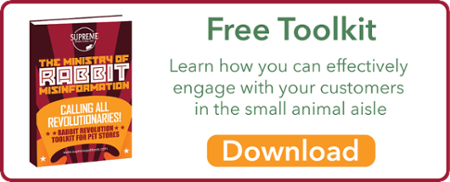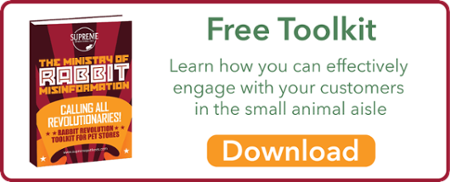According to the House Rabbit Society, in 2014, there were approximately between 3-7 million rabbits owned as pets in the United States. Although this number may seem small compared to the 77.8 million pet dogs in America between 2015-2016, there are still a lot of rabbit owners who are looking for ways to give their small furries a long and happy life. In fact, the House Rabbit Society states that rabbits are the third most popular companion animal in the United States.
Although there are statistics showing the popularity and growth of responsible rabbit ownership, there are many pet stores who are still not carrying and promoting the complete solution to new and current responsible rabbit owners. Part of the problem might be the overall confusion behind the small animal category as a whole. Studies show that shoppers often find the small animal category confusing and hard to shop, and many stores are unable to put the time and effort into merchandising a complete solution for small pet supplies.
We're fortunate to have access to multiple manufacturers of pet products within the industry, and we have a one-of-a-kind view of how these products can best be sold to consumers. We have found that offering a complete set of rabbit products in one place through best-practice buying and merchandising behavior has lead to increased sales, not only within the small animal category, but also throughout the entire store.
In this article, we'll discuss the types of rabbit products every pet store should include in their small animal department.
1) Rabbit Hutches
When you think of a small animal aisle that is complete with products any new or current rabbit owner might need, you might think of rabbit food, treats, toys, hay and bedding. The best part is that these products don't take up much shelf space and are easy to display. The problem is that a rabbit owner, especially a new one, is going to need a rabbit hutch that fits their needs. Many independent pet stores try to save space by only selling small wire rabbit cages that aren't sufficient for responsible pet ownership .
.
A crucial part of offering the whole solution to those who own rabbits is to make the purchase of a great rabbit hutch
as easy and accessible as possible. In case you're concerned it won't fit in your store's small footprint, don't worry.
During Super Zoo 2016, Advantek revealed their new packaging of rabbit hutches and chicken coops that are retailer friendly, even for small neighborhood pet supply shops. The company is also currently undergoing extreme product development changes which will allow for their products to offer a solution to even the most responsible rabbit owners.
Related Article: 3 Ways the Pet Industry is Becoming More Humane
There is a growing movement of rabbit owners choosing allow their rabbits to roam freely in the house or garden during the day. While this is a great way to house a rabbit, many customers may still need habitats for their little hoppers at night or while traveling. Advantek's habitats are perfect to use indoors or outdoors, and are available in different sizes and colors to suit the customer's needs. Latches are being improved to predator proof standards and the company is currently undergoing extensive research on humane rabbit habitat standards as it is known to consumers today. With the humanization of pets on the rise, Advantek is trying to stay two steps ahead of the curve.
Click here to learn more about Advantek products, including rabbit hutches.
2) Good, Better, Best Rabbit Food
Although it's crucial to the success of the small animal department to make sure it's as simple as possible, it's just as important to offer various options to customers as well. Some of your customers will be brand loyal, others will want to try the latest and greatest feeding solutions. You will also still have customers who will want to make sure they are always feeding the most complete, balanced, and highest quality diet to their pets, no matter what the price. You'll want to appeal to as many rabbit owning customers as possible, and doing so will require a good, better, best merchandising strategy.
The best way to understand which products fall into the "good" category is to take a look at their price points and ingredients. Products with the lowest price points are likely to have some controversial ingredients. Carrying a limited supply of these products is a good idea, however, as it will give those on a budget the ability to feed their pet, at least for a short time until they are able to afford a higher quality food. Some examples of ways to identify "good" quality and inexpensive small pet foods include:
- Foods with added sugars
- Foods with dried fruits, pumpkin seeds and sunflower seeds
- Foods with whole maize, dates, raisins, or peanuts
- Foods with tomatoes, potatoes, or onions
Those pet foods in the "better" category may still be slightly controversial for one reason or another, but their guaranteed analysis more closely matches the nutrients that are great for each small pet. Because of the higher quality of nutrition, there is a higher price point attached to these as well. This is a great "middle" option for those who can afford better nutrition for their pet, but still not the best.
Related Article: How to Rock the Small Animal Category
For example, Supreme's Tiny Friends Farm line fits perfectly within this category. Their tasty mixes are perfect for encouraging small mammals' foraging instincts, but the variation may cause pickiness. The quality of the food is great, but when pickiness comes into play, the pet may not get all the nutrition they need and instead pick out only the food pieces that are alluring to them. Some examples of ways to identify "better" quality small pet foods include:
- Foods with added sugars
- Foods that do not prevent selective eating*
*Foods that encourage natural foraging behaviors are still great options as long as your customer's rabbit is not a picky eater. If so, you'll want to offer a diet that prevents selective eating behaviors such as Science Selective.
That's where the "best" category comes into play. Supreme's Science Selective line is a perfect example of food that fits into the best category. Not only do consumers consistently love the quality of the food, but so do their pets. If a pet is particularly picky, as described above, then Science Selective is the perfect option. It's a palatable food that is the only extruded pellet in the U.S. market, which gives them consistent nutrition as they eat it along with hay. Some examples of ways to identify "best" quality small pet foods include:
- Foods with no controversial ingredients
- Foods with no artificial preservatives
- Foods with no added sugars
- Foods that are fully mono-component (preventing selective feeding)
- Extruded foods (making it highly palatable & nutrition more digestible)
Unfortunately, it can be difficult to engage your customers while they're shopping the small animal aisle. They're either rushing to get in and out of the store or confused by the number of options. In addition to merchandising the category well, a strong engagement strategy is the key to success in small pet supplies. Supreme Petfoods put together a Rabbit Revolution Toolkit that you can use within your store to boost sales within your small pet category.
3) a Selection of Rabbit Accessories and Treats
Rabbit's teeth grow 3-5 inches on an annual basis, and never stop growing. Because of this, rabbit owners will need to provide their pets with chew toys, treats, and diets that allow for maximum chewing and dental break-down. This way, their bunnies' teeth will stay healthy and over-growth will be prevented.
The number one rabbit "accessory" that is crucial to offer in stores is hay. Rabbits need their diet to be 80% hay in order to stay healthy. Although Supreme Petfoods does not offer hay in the United States at this time, there are plenty of other Timothy Hay options that will be sufficient for optimal rabbit health.
Other essential rabbit accessories to offer include treats, which are great for training rabbits. While treats are a great addition to a rabbit owner's basket, it's important to explain that they should only be fed on special occasion, or broken apart into very small pieces for training purposes. However, when fed correctly, they are a great resource for bunny owners, and always a fun experience for your customers to pick out in the small animal aisle.
In addition to the hay and treats, you'll want to stock chewable rabbit toys, watering and feeding solutions, and litter boxes along with instructions on how to best train rabbits (need help writing training instructions? We have written an article that you can use in your blog with credit to Supreme Petfoods! Reach out to us here to request this material).
Merchandising Tip: Set up an end cap in your small animal section with documentation on rabbit training and ownership and a recommended set of products for first-time rabbit owners. This will help engage them and educate them on responsible rabbit ownership.
Keeping Employees and Customers Engaged
One of the biggest challenges with the small animal aisle, along with merchandising, is keeping both employees and customers engaged with the category. Supreme Petfoods and All Points Marketing have worked together to address these well-known challenges with retailers who are currently carrying Supreme and/or Advantek products or who are thinking of it.
We offer a fully customized and complete merchandising strategy, employee training for any retail store, and a downloadable toolkit with suggestions for keeping customers engaged.
Related Article: Engaging Shoppers with the Small Animal Category
GET IN TOUCH
Download our app and keep in touch with us, no matter where you are!
ABOUT THE AUTHOR
Ashley Hoffman – E-Commerce & Digital Marketing Manager joined the All Points family in April of 2015. Ashley brings a fresh outlook to the marketing industry as well as a constant desire for learning something new. She is dedicated to consistently improving her skills and efficiency in the marketing industry and using those skills to promote APM and all brands we represent. Ashley has grown up with many animals throughout her life and is currently the loving owner of two cats.
Click here to sign up for our monthly newsletter to stay up to date on current market trends in the pet industry
No Comment








Leave a reply
Your email address will not be published. Required fields are marked *